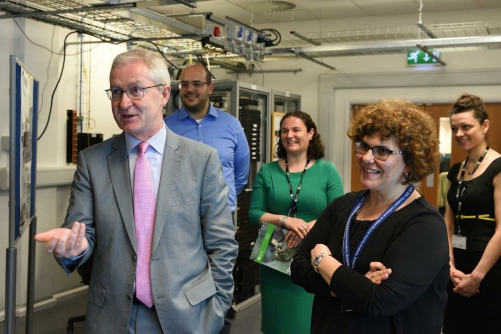Experts from leading 5G research institutions, the universities of Bristol, Surrey and King's College London, will be awarded £16 million to develop the cutting-edge 5G test network which will see academic expertise and commercial leadership brought together to trial the technology and make sure people and businesses can enjoy the benefits sooner.
5G is expected to deliver reliable ultrafast mobile connectivity with the ability to process huge amounts of data and support complex applications predicted for tomorrow’s mobile phones - for example, sending virtual reality 3D TV clips to mobile devices.
It could also be used in new technologies that have the potential to revolutionise society such as autonomous vehicles - for example, to make sure they can be used safely on our roads - or in advanced manufacturing and robotics, augmented reality, remote surgery, smart agriculture and in smart homes and cities.
Minister for Digital Matt Hancock said: "We want to be at the head of the field in 5G. This funding will support the pioneering research needed to ensure we can harness the potential of this technology to spark innovation, create new jobs and boost the economy.
"We know 5G has the potential to bring more reliable, ultrafast mobile connectivity, with quicker reaction times and larger data capabilities, and I'm thrilled to announce King’s College London and the universities of Surrey and Bristol have agreed to collaborate on this project."
Professor Nishan Canagarajah, Pro Vice-Chancellor for Research at the University of Bristol, added: "5G is set to be rolled out across the UK by 2020 and this important alliance will enable us to be at the forefront for research in 5G, smart cities, optical networks and cloud technologies both in the UK and across the world. The University has an international reputation for pioneering research in telecommunications technologies and this strength is a key strand for the University's plans for the new Temple Quarter Enterprise Campus, which aims to create more opportunities for the region’s businesses and citizens."
Professor Dimitra Simeonidou, Director of the Smart Internet Lab at the University of Bristol and Chief Scientific Officer for Bristol Is Open, explained: "The Government's investment on 5G platforms will provide a major boost in developing and demonstrating these technologies, and will make a real difference to the UK industries and consumers alike. University of Bristol is an international leader in 5G research and experimentation and will contribute considerable knowledge and assets to the UK 5G trials programme."
The centre will trial and demonstrate the next generation of mobile technology and is the first part of a four-year programme of investment and collaboration in our 5G Testbeds and Trials programme.
The universities will work together to create three small-scale mobile networks which together will form the test network. Each network will have a number of the elements expected in a commercial 5G network - including mobile signal receivers and transmitters and the technology to handle 5G signals - to support trials of its many potential uses.
The project will build on existing research and help to make the case for timely deployment of 5G in the UK. It will help make sure the country is ready to capitalise on a potentially huge global market for 5G products and services and create opportunities for British business to grow at home and abroad. It will also mark the first steps towards developing a new national 5G Innovation Network.
Professor Andrew Nix, Dean of the Faculty of Engineering and Head of the Communication Systems and Networks group, commented: "As part of the University of Bristol's Smart Internet Lab we've been developing some amazing 5G technologies. For example, we hold the world record for spectral efficiency with our 5G Massive MIMO basestation. We're also a world leader in the use of millimeter spectrum and software defined networking. Working with our industrial and academic partners, we aim to show off some of the incredible new services made possible by 5G networks."
Maria Korea, Manager of the Smart Internet Lab and Programme Manager for the University of Bristol 5G Testbeds and Trials Programme, added: "Bristol has the technical expertise, capabilities, strong industrial partnerships, a rich digital SME eco-system and collaborative city leadership necessary to enable fast deployment of 5G technologies at scale and perform end-to-end 5G trials."
This investment is aiming to deliver a 5G end-to-end trial in early 2018. This could be, for example, a trial in which a signal is sent from a mobile device, such as a phone or in a car, to a data centre and back again. This will test the capability of 5G to make an application or service work in a real-world environment.
